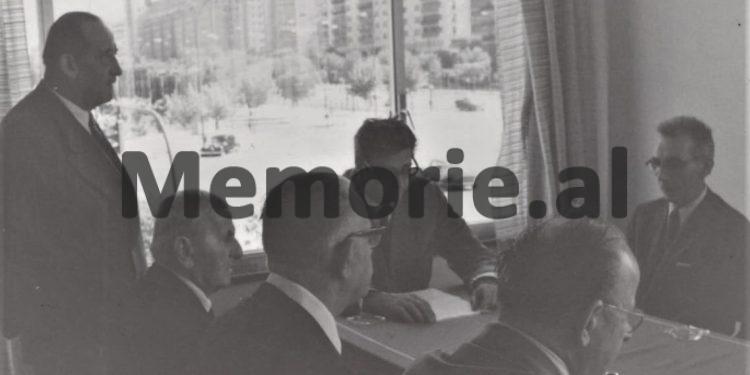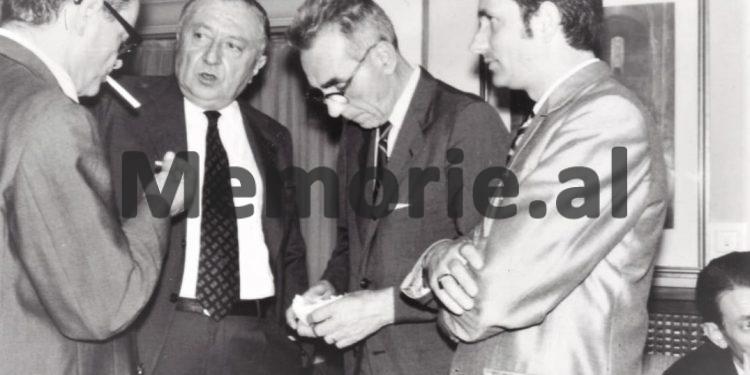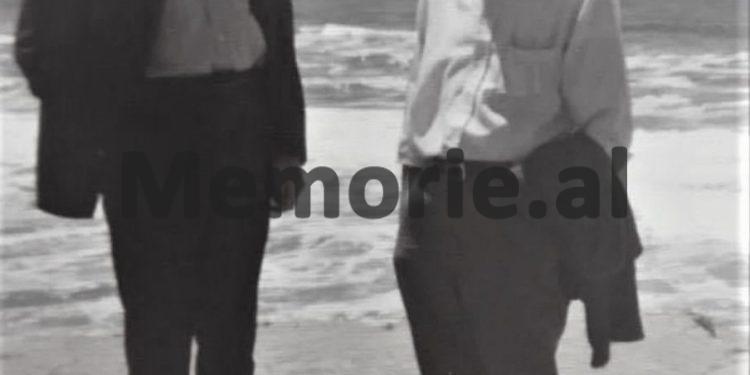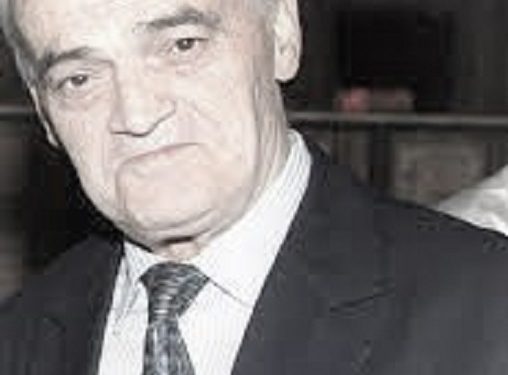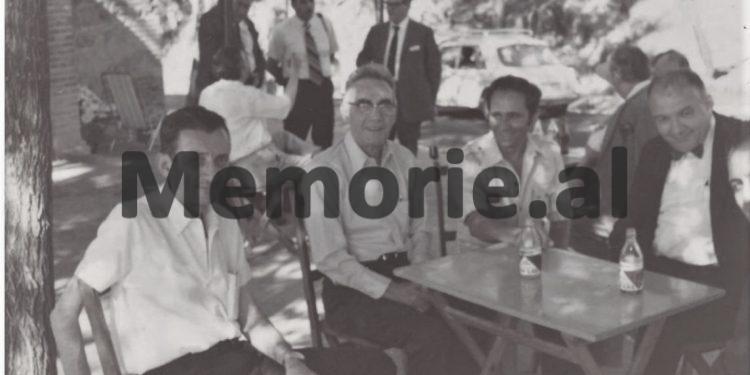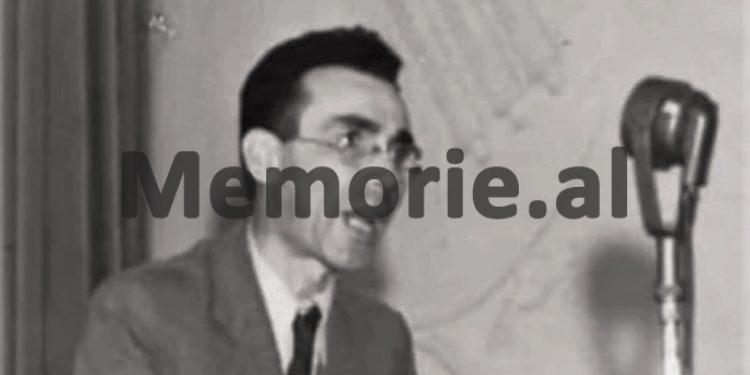By Idriz Lamaj
Second part
From the works of the apostles of ethnic Albania
Xhafer Deva
In light of his own letters and other diaspora revelations
Preface
Memorie.al/ Probably like many others, I often browse letters with my friends and associates, who are no longer in this life. Browsing through them, for a moment unfolds memories that it seems to me that some of them can serve our history. Then, I return to the awareness of the current difficult situation in the ethnic homeland, caused by the quadruple of Albanian politics, I say to myself: “What can my memories of others or the letters of the people of dead?”
Without being the ominous instigator of pessimism, thinking as always of a better future, I return to my obligations to my friends, and as an icy observer of time, without any claim of historical service, when I am given the opportunity of publication, write what I have in mind, always based on their writings and letters. This principle is also followed in this book about Xhafer Deva. I knew Xhafer Deva in person; we exchanged visits and had a strong correspondence.
I spent days off at his house and inherited all of Xhafer Deva’s correspondence with Rexhep Krasniqi, his closest friend, for more than 40 years. After many years, I talked on the phone with Mrs. Deva’s daughter and son-in-law. In the conversation going on, taking advantage of the old friendship, I asked about his letters and they informed me that it was all Qefali Hamdia, a friend of their family.
In June of last year (2001) I went to Kenosha, Wisconsin, a guest of Qefali Hamdia, to look at Xhafer Deva’s correspondence, which Mrs. Deva sent her years ago, when she, due to her advanced age, was closed his house to go to the house of his 5th daughter and son-in-law, Mrs. Burgl Dagmar and Rev. Dennis Logie.
After reading the bulk of the letters, in the languages I knew, I took with me more than a thousand pages of his correspondence, covering a period of over 30 years, 1945 – 1978. Xhafer Deva spoke and wrote seven – eight languages. His correspondence is: Albanian, English, German, Italian, French, Turkish and Serbian. Xhafer Deva’s letters and writings, with the exception of those in Old Turkish and Serbian in Cyrillic, are mostly typewritten, well-kept, and alphabetically arranged, with the persons he dealt with.
That includes his family letters. He carefully kept a copy of every letter he sent and every letter he received. Mrs. Oswalda Deva, daughter Burgl, son-in-law Dennis Logie and Mr. Qefali Hamdia with family, expressed his heartfelt thanks for the trust they gave me. With special gratitude I recall here the help given to me by my brothers – Captain Nue Gjomarkaj and Nikoll Gjomarkaj, in the preparation of one of the most important chapters of this book.
Kapidan Nou, in addition to making available the subject on Xhafer Deva’s relations with the ‘Independent National Bloc’ and sending paratroopers to Albania and Kosovo, reviewed with me each document of that period, and we formulated the text in the form of a conversation; while Nicholas, deciphered the letters, transcribed and translated from Italian, the unpublished materials to date, which were published in this chapter.
Continues from the last number
Xhafer Deva’s life and activity in exile
– Kosovo in the time of ethnic Albania –
During this time, part of the ‘Kosovo Group’ that had immigrated to Australia managed to establish for the first time a political, social and cultural movement, which took the name “Union of Albanians in Australia”? In this organization, Albanians of different political ideas first gathered. The main merit for the creation of this organization belongs to Xhelal Mitrovica, from whose hand came the organ of the association, the newspaper “Vatra Shqiptare”. The issue of ethnic Albania in this newspaper occupies the main place. It is enough to read in the controversial editorials of ‘Brithyesi’ and the studied articles of Dr. Rexhep Krasniqi.
Finally, seeing the possibility and the fact that New York was becoming the main center of Albanian political refugees, members of the ‘Kosovo Group’ who were constantly in touch with each other, decided to emigrate to the United States of America. Here, the most prominent representatives of the ‘Kosovo Group’ resume their activities always for the benefit of national unity and ethnic lands. Their work, whether isolated in small groups or in the complex of Albanian issues, is well known. But a perfect political organization, in which Kosovar expatriates participate an masse, is done only when Xhafer Deva emigrates and settles in the United States of America.
In November 1956, Xhafer Deva came to America with his family. Despite the constant changes of environment and lifestyles, he did not change at all; not even the efforts and difficulties of finding a job overcame him. As always everywhere, Xhafer Deva preserved and held high the honor of the Albanian, the strength of his character and personality. He faced all the problems of family life, but never sought to have something special done for him, even by his closest friends, who never missed him. In New York and Boston he lived with manual labor. Xhafer Deva was everywhere and looked at the life of this country from all sides. He was also content with physical work, enough to support the family living and not be left at the expense of anyone.
Xhafer Deva hated parasitic life to death. In 1960 he moved to California, initially to Calavera County, where he settled with an American friend. There he found work in a sawmill as a simple laborer. So fate brought him that after more than 20 years, to repeat the previous work in that factory, which reminded him of his sawmills in the Ibar Valley. He faced the work with patience and without complaint and was satisfied that with the sweat of his brow and the toil of his arms he was helping the schooling of the adapted children.
The next phase of his life relates to Stanford University in Palo Alto, California, where Deva worked in the accounting office until 1972 when he retired. There Xhafer Deva perfected the use of the computer, gained respect and position and made friends in high circles of that famous university. His mistress, Oswalda Deva, was also employed at the university library in question. She became director of the rare book department. An exhibition of books also included the oldest German edition of “Skanderbeg History” by Marin Barleti.
This rare book was found by Mrs. Deva, who also suggested its purchase from Germany. After settling in Palo Alto, Mrs. and Mr. Deva felt more at ease devoting them to family life, but again he had no peace and no restraint. When he thought that his body was relaxing after working hours, he felt the urgent need to unite Kosovars in exile in the free world, those who kept the memories of suffering and sacrifice for the entire Albanian people under communist Yugoslavia. The feelings that Xhafer Deva changed in his soul, also changed together with his exiled locals, who persistently sought to reorganize around a political movement, where they would gather and mourn the common ethnic problems, to have an organization and a body to raise the silent voice of Kosovo.
The initiative for a massive reorganization of the Kosovar diaspora in the free world was taken by proven Kosovars in the field of sacrifice and self-sacrifice, such as veteran fighters: Bajrush Kosova, Destan Berisha, Musa Vuçitërni, Hysen Terpeza, Mehmet Agë Rashkoci, Kalosh Hamdia, Isuf Adili, Iliaz Peka and the energetic young man Ismet Berisha. Convinced that Xhafer Deva would not leave them in the lurch, but would respond to their call, these fighters decided, against his will, to leave the burden of political leadership to him. For this purpose they went to Palo Alto, presented the need for reorganization and with Kosovar insistence closed all the paths of rejection.
Xhafer Deva, now in old age, busy with work that did not allow hours of absences, found in national and international circumstances completely different from those of the time when he had played first-hand roles, far from living with compatriots with whom he will worked, with very few intellectuals for comprehensive organization and representation in various forums, it was not at all easy to accept the call, but the conscience of responsibility pushed him to accept. The ethnic diaspora felt as enthusiastic again as in the time of resistance, when they fought life and death to stay together with Albania. With personal sacrifices, Xhafer Deva goes to New York from time to time and reorganizes the League of Prizren in Exile, which was based on its historical past and the high national principles of the Second League of Prizren at home.
To the revived organization in New York, Deva gave it the modern shape of the time, creating representations, a press office, and an accounting office. Although this organization had not yet convened its first Congress, the Tirana and Belgrade press began their propaganda campaign against Xhafer Deva. From the series of articles published in “Vecernje Novosti” in Belgrade and “Zeri i Popullit” in Tirana, entitled “Xhafer Deva on the move”, it is clear that they had not forgotten who Xhafer Deva was when he was on the move. In December 1962, rather than announcing a counter-response to the
Belgrade and Tirana regimes, rather than addressing anyone else, the League’s press office released the draft program “Kosovo Group – Prizren League” ”.
The ‘Kosovo Group’ in the process of reform, based on a bright historical past, follows the national and political principles of the League of Prizren, which can be summarized in this single formula: in the existence of Albania as an independent state, to summarizes all the places inhabited by the vast majority of Albanians, in one ethnic Albanian. This group relies on the legal right of its being and its efforts for the national and human rights of the Albanian population under the Yugoslav state, in the bright wars of the First League of Prizren and in the free elections of the Second League of Prizren. , in October 1943, elections held in the traditional democratic form of Kosovo within those conditions and political and military circumstances in Albania of that time, during which other organizations of the nationalist resistance emerged.
This group has a purely Kosovar character and does not want in any way to interfere in the party political issues of 1913 Albania, but will always be ready to help strongly for the liberation of Albania from communist tyranny. We also seek the understanding and support of all Albanian national political groups in exile, in our efforts to unite the Albanian countries under Yugoslavia with the Albania of 1913. We also want to have the same relationship with all these groups. The ‘Kosovar group’ in principle cannot accept that the Albanian captive countries under Yugoslavia be represented directly or indirectly by persons, groups or political parties that are not Kosovars. As a result, we do not seek our independent representation from Albanian political groups and parties, nor do we want to get involved in their harmful political games and quarrels.
The ‘Kosovar Group’ consists of proven fighters of the Kosovar war for the preservation of the union with Albania of 1913, of ordinary people, ready for any sacrifice in the service of the ethnic homeland, of free intellectuals and professionals, who have contributed to this direction, etc. They are aware of the historic mission of the League of Prizren for an ethnic, free Albania and decide to follow this ideal path until its realization. The ‘Kosovar group’ is not about other self-proclaimed “Kosovar” groups, which, without having a legal basis of representation of the Kosovar population and the fight for the liberation of the Kosovar homeland, distort the true expressions of the will of the people of Kosovo.
Finally, the ‘Kosovar Group’ – the “Prizren League”, recognizes as spiritual leaders and active the distinguished son of the enslaved Kosovo, Xhafer Deva. According to this project-program that briefly explained the position and goals of the League of Prizren in Exile, large masses of Kosovar diaspora in the free world, joined it and established branches in Australia, Syria, Turkey, Belgium, France, West Germany, Canada, the United States and wherever a small Kosovar colony was located. With special interest and with their presence, the main representatives of the Albanian political parties in exile, of the religious institutes, of the “Vatra” Federation, of the “Free Albania” Committee and of the intellectuals not engaged in the political currents of the diaspora, conveyed the Congress of The first of this organization that took place in November 1966 and was run with rare skill by Xhafer Deva.
All the occasional speeches, telegrams, congratulations and messages he received from compatriots, as well as from foreign personalities, express the full conviction that the Kosovar diaspora in the free world, united around the person of Xhafer Deva, will be a powerful weapon that will lead to the realization of the ideals of ethnic Albania. The serious press of the newspaper “Lidhja e Prizrenit”, led by talented journalists and assisted in writing by well-known intellectual collaborators, best confirm the echo of this organization in exile and highlight the seriousness and effort of Xhafer Deva in the political campaign and in national and international activity for the benefit of Kosovo Albanians. Thanks to his name and activity in the past, Xhafer Deva introduced the League of Prizren in Exile into the ranks of well-known international organizations that fought resolutely against the oppression and communist dictatorship.
In this regard, Xhafer Deva’s attempt to rank the League within the internationally recognized organization, the European Oppressed Minorities (FUEN), is a separate chapter. Some people, who were not able to understand the importance of Xhafer Deva and the League of Prizren in this organization, sabotaged the issue naively. However, Xhafer Deva, with his characteristic wisdom, in order not to make the Kosovo issue ridiculous, withdrew the League’s request for membership, but continued his effort to emphasize the issue of the Kosovo problem in that organization, as a personal friend of the Secretary General. , z. Povel Skategard, who hosted him at his home several times. From their intense correspondence, which continued until Xhafer Deva was brought to his knees by the disease, it is clear that this well-known personality appreciated Xhafer Deva.
Skategard describes Deva as a master of the problems of European national minorities and often asks him for diplomatic advice. Xhafer Deva with his sharp intuition, persistently defended the basic points of the Statute of the organization he presided over, although he often encountered obvious contradictions with some members of the organization, but he did not make the slightest concession to the principles of the Statute of the League of Prizren in Exile. He explained his convincing reasoning regarding the position on the idea of the Republic of Kosovo under Yugoslavia openly and in print during the Second Congress of the League, in November 1971.
His position was based on the principle of a 100-year historical period, since 1878, a position held by the intellectual cream of the ‘Kosovo Group’ in the establishment of the Second League of Prizren and was approved by free votes of the representatives of the people of Kosovo. at home, in 1943. It is clear from this that the Statute or the draft program of the Kosovo Group could be amended only with the free votes of the people enslaved under Yugoslavia.
As a well-known, far-sighted, sincere and impartial personality, Deva was asked by the Albanian political exile groups for advice, for organizational help and support, for mediation, rapprochement and cooperation between them. In 1972, we find Xhafer Deva in Madrid as the coordinator of the talks hosted by the representatives of the Albanian political parties in exile. For his sincerity, simplicity, wisdom, and unwavering obedience to the law, he was elected chairman of the meeting in Madrid, as well as in the continuation of the same talks later in New York. Frequent travel from California to New York, Spain, Italy, France and elsewhere, at an advanced age, exhausted him immensely physically and spiritually. The troubles of that time left deep marks on his forehead. The assassination of Kalosh Hamdi, who was one of the strongest pillars of the League, took place at the same time.
While Deva kept invincible the hope of organizing the Albanian diaspora in general, the loss of Kalosh Hamdia was a heavy blow to him. Despite that crisis, he tried to avoid diaspora disputes by keeping in constant touch with its most important exponents, by telephone and correspondence, and by advising them on agreements, work, and constructive action, even though there were no more the slightest personal interest or future position. Indeed, as he had clarified in time his position, that of the League of Prizren, the Federation “Vatra” and the Committee “Free Albania”, their non-partisan programs would not allow the representatives of these organizations to intervene in the issue of their mission, and that of Deva himself, ended after the signatory parties closed their meeting at the Mc Alpine Hotel in New York in 1975.
It should not be left without mentioning here that the coordination of the forces of the political diaspora in the field of press and propaganda, Xhafer Deva has been giving special importance recently. He stressed and reiterated that the Albanian diaspora should have a common press, which should be run by capable people, which he tried to implement in his organization. This was also one of the main goals, in accordance with which he accepted the call to the meetings in Madrid and New York. After all those journeys, efforts, counsels and disappointments, Xhafer Deva’s activity ended with an exhaustion and complete destruction of his endless energies, in the long and bitter exile. He inherited only the ideal of ethnic Albania. Xhafer Deva died on May 25, 1978, on the eve of the 100th Anniversary of the Historical League of Prizren.
To his death in exile, in office as President of the League of Prizren, responds to this statement of Hasan Prishtina, to whom, Dr. Rexhep Krasniqi and Ing. Xhafer Deva, even though he was in exile, was sentenced to death: “For us Kosovars, as death in the homeland enslaves us, as death in exile is equal, it is a heroic death that honors us. For us, these two deaths are the hallmark of our disagreement with the fragmentation of the homeland and its enslavement. We are not afraid of yesterday nor are we afraid of death today. While I’m away from my homeland, to me, both death by bullet and death by mattress are one. “I will stop fighting and opposition only when my nation dies or when it is liberated and united.”
I brought this summary of the life and activity of Xhafer Deva in exile, published 22 years ago, to commemorate my collaboration with dr. Rexhep Krasniqi, during the preparation of the book: “Xhafer Deva – Life and Activity”, New York 1980. Memorie.al




